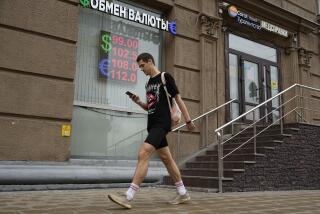Soviet Economic Crisis Worsens, New Data Shows
- Share via
MOSCOW — The Soviet Union’s economic crisis, already grave, is deepening despite the efforts of President Mikhail S. Gorbachev to pull the country out of its steep decline, the State Committee on Statistics reported Sunday.
The country’s gross national product dropped 1% in the first half of the year, compared to 1989; labor productivity fell by 1.5%, and national income dropped by 2%, according to the committee. Most production figures declined even more.
Inflation, the trade deficit, debt and unemployment were all up sharply, however, as the government failed to bring the country’s economic problems under control.
“There was no economic recovery,” the official Soviet news agency Tass commented bluntly. “The crisis in the development of the national economy intensified.”
Unemployment is now at 8 million out of a work force of 164 million. Prices increased officially 5% in the first half of the year and, in reality, about three times that. Government revenues are running nearly 20% less than what was planned, and the budget deficit, which was to be held to $103 billion, is consequently growing, not shrinking, and a surge in imports has increased the trade deficit by 150%.
The effect, the State Committee on Statistics said, was that workers were earning more money for producing fewer goods--and as a result were paying higher prices for basic necessities, particularly food.
The price of potatoes, as a result, jumped 10%; fruit prices were up 14%, and vegetable prices increased 9%. Overall, consumers spent 14% more on basic goods and services, according to the report, even as shortages of virtually everything grew.
With the country facing serious difficulties in gathering this summer’s harvest, each of these statistics stands out in bold relief from a report that usually has few readers and holds little interest for the working person.
The political harm to Gorbachev is likely to be even greater than the statistics suggest, for the nation’s patience has worn thin, social discontent is growing--and conservatives are crowing that they had warned what the country needed was better planning and better management, not a transition to the “regulated market economy” that Gorbachev wants.
The Soviet president was told bluntly in a weekend meeting with some of the country’s leading economic analysts, most of them liberal or radical reformers, that he has nearly run out of time for his reforms and that their failure so far to reverse the country’s economic decline is costing him the political support he needs to continue.
“Time is catastrophically short,” Nikolai P. Shmelev, one of the economists, told him, according to an account of the frank, four-hour meeting published by the government newspaper Izvestia. He warned that the growing shortages of food and consumer products of all types are “socially dangerous” and must not be prolonged, Izvestia said.
“We must not waste time--it is catastrophically running out for us,” Shmelev said, urging Gorbachev to borrow heavily abroad to finance the import of consumer goods.
Without such imports, “the tension in society will grow,” Shmelev argued, “and the efficiency of the economy will decline because there are fewer and fewer stimuli to work well when the shops are empty.”
Igor M. Klyamkin went further and told Gorbachev that the government of Prime Minister Nikolai I. Ryzhkov has lost all credibility, as have the different economic reforms it has proposed. Gorbachev needs a new Cabinet and a different strategy if he hopes to restore momentum to the reform effort, Klyamkin said.
Western aid, in fact, is now emerging as a key part of Gorbachev’s strategy, buying time for the structural reforms to work by restoring popular confidence in perestroika, as his reforms are known.
“Despite all the complications and the differences of positions of some countries, we can hope for aid, including financial,” Gorbachev told the economic analysts, according to Izvestia’s account. “There is such a viewpoint that the more difficult it would be for us without aid, the more radically we will carry out the reforms.
“But I must say that the lack of freedom to maneuver might make us apply stricter regulations and thus interfere more in the economy. I am convinced that our perestroika is needed by the world no less than by ourselves.”
On Sunday evening, state-run television reported that the government, which has been exploring low-term, low-interest loans from the West, is asking the United States to provide substantial credits for grain purchases.
“Still apparently not believing in the enterprise of collective and state farms, the government has asked the Bush Administration for credit to buy American grain,” a newscaster said during a report on the grain harvest.
A U.S. Department of Agriculture spokeswoman said in Washington last week that Soviet officials are interested in $2 billion worth of loan guarantees to buy food but that such credits depend on congressional approval of the new Soviet-American trade agreement.
The report by the State Committee on Statistics made clear that government has made almost no progress on correcting many of the economy’s key problems.
“A definite increase in pay for labor in comparison to the output of production is continuing, which worsens the situation on the consumer market,” the report said. “The output of money increased. . . . The buying power of the ruble dropped.”
The balance of trade also continued to worsen. The value of exports dropped from $57.6 billion in the first half of last year to $52.2 billion in the same period this year; meanwhile, imports increased from $61.9 billion to $63.3 billion.
Exports to countries of Comecon, the Soviet-led trading bloc that includes its former allies in East and Central Europe, dropped 10.2% as those nations sought to reorient their economies away from the Soviet Union.
Gorbachev and Ryzhkov have pledged to undertake reforms next year that will transform the Soviet economy from one based on state ownership, central planning and bureaucratic management into one in which the market prevails, workers become the principal owners of their enterprises and private entrepreneurs can challenge what had been state monopolies.
But the costs are high--a sharp and immediate increased in state-controlled prices, extensive unemployment, the closure of old enterprises and the bureaucracy’s loss of power.
More to Read
Sign up for Essential California
The most important California stories and recommendations in your inbox every morning.
You may occasionally receive promotional content from the Los Angeles Times.













